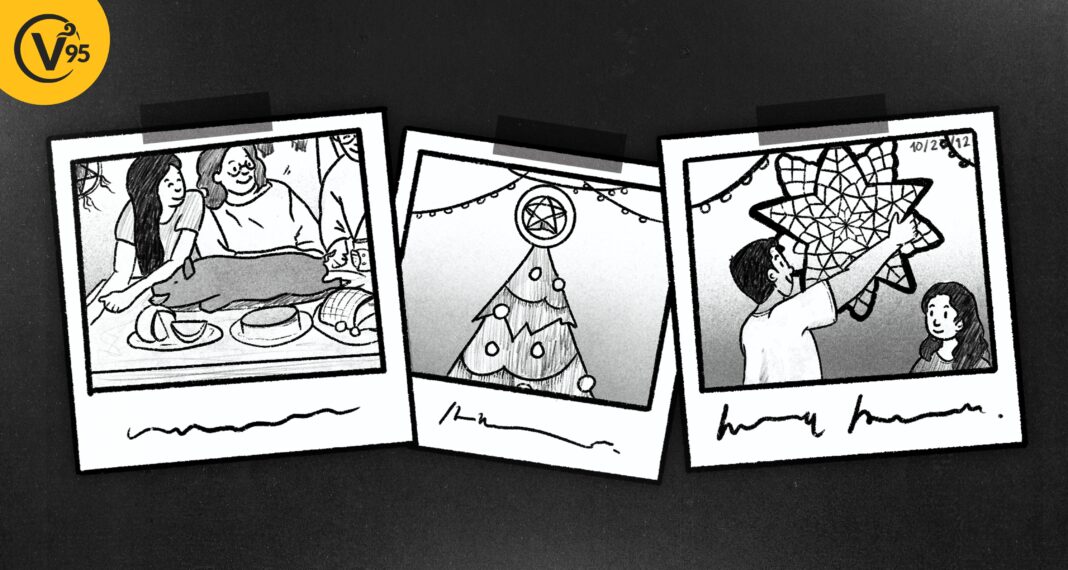December 2012 was one of the saddest, if not the saddest, Christmases I had ever “celebrated.”
It was a fairly uneventful holiday—we had barely put up any Christmas decorations around the house, and caroling was banned in our village after multiple instances of robbery were reported.
We did not even get to go to the province, in Ilocos Sur, where we would have been welcomed by our relatives with heaps of food and a karaoke eager for some much-needed Christmas jingle key in. Instead, we were left holed up in our house—me, my mother, and my siblings.
But apart from all that, this was also the first Christmas we celebrated distant from my father who had just left for the Kingdom of Saudi Arabia (KSA) for a new job a few months prior. Had he been home, he would have been blasting his party-like, Christmas-themed hit song mashups through the speakers, his obnoxious way of signaling the start of the holiday season.
December was quiet for us that year, even more so for my father. More than the loneliness, what Grinched Christmas away from my father was the restrictive religious measures of Saudi Arabia that barred its residents from practicing and observing the celebrations of a faith other than Islam.
Starkly different from the Philippines, where Christmas is always boisterous and lustrous with all the parol and tin can carols, the only festive sight in the KSA were the typical lights installed in malls.
KSA, deeply rooted in Islamic traditions, was a country where commemorating holidays of other beliefs was deemed illegal. Christmas trees or even mere garlands were not openly sold to the public, and if you wanted to have some semblance of Yuletide at your home, you would have to source decorations from underground merchants.
This was how Christmas was celebrated in Saudi—through hushed whispers.
In fact, Christians who wished to pray and practice Christian traditions during Christmas had to hide in secluded areas, preferably in a scant apartment, where small groups would hold “Masses” to celebrate the birth of Jesus Christ.
My father was often invited to these gatherings. He was reluctant to join because of the fear of being discovered by authorities, especially since in the past, there were “door-knockers” who would bang unexpectedly on doors of homes and establishments—including stores, groceries, pharmacies, and the bank where my father worked in. This was a practice done to remind citizens to strictly comply with Salah (prayer), by temporarily closing all shops and halting transactions.
For him, he wouldn’t risk getting caught celebrating Christmas in secluded areas by these door-knockers.
The only celebration he would look forward to doing was when his fellow overseas Filipino workers would invite him to dine out together during Christmas at some Filipino restaurant. This was the closest semblance of Christmas celebrated back at home, he said.
Taboo no more
But just like all things in life, traditions and customs are subject to change, too.
Ever since Crown Prince Mohammed bin Salman released “Saudi Vision 2030” in 2016, Christians have noticed the country slowly opening up to Christmas. This was aligned with the objectives of the reform, which was to achieve a much more diversified economy and culture for the country through little steps, such as slowly allowing women to drive, allowing concerts, and reopening cinemas.
As such, more and more Christmas decorations, may it be fake snow, trinkets, and now even Christmas trees, began to be publicly sold in local markets, as well as seen in public display in malls and cafes—much more different from when my father first arrived in Saudi. There were no more door-knockers to remind them of Salah (prayer), too. This gradual opening up sends the message that the holiday is slowly being welcomed and is no longer a taboo in the conservative country.
Despite this change, many Christians, including my father, remain as careful as possible to avoid any mishaps that may get them into trouble.
Besides, as my father would say, while he may have learned to love the KSA—he had brought home far too many vintage Arabian pieces to adorn our home and had even adapted an accent—nothing compares to celebrating the Filipino Christmas.














